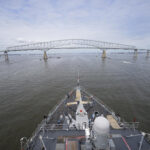In the fourth installment of Dr. Craig Vanderwagen’s groundbreaking five-part series Implementing the National Health Security Strategy, the founding Assistant for Preparedness and Response, U.S. Department of Health and Human Services, examines the challenge of visibility during an emergency response when events are fluid and information is changing and lacking clarity.
Visibility is information that clarifies what has happened and reveals the progress of response and recovery. It is different than situational awareness as it encompasses a wider variety of information sources, some of which may not be traditionally reliable. It may include social network information that traditionally has not been “vetted for reliability and credibility,” but whose influence in public perception of events may be quite important in addressing not only what is expected in the immediate response, but the resilience and recovery posture of the society at large.
In this essay, Dr. Vanderwagen explores how tactical data elements must be reduced to the information most necessary to understand the operational and strategic effects of response efforts, including: (a) visibility of the inciting trigger; (b) analyzing information for data that allows for an awareness of developing risks; (c) developing dashboards for information in real-time; and (d) delivering pertinent detailed information locally.
- Watch Dr. Vanderwagen in a video preview of this white paper.
- Download Event Management: Visibility in the Fog of Response white paper.
- Learn more about the Implementing the National Health Security Strategy white paper series.

W. Craig Vanderwagen
Rear Admiral W. Craig Vanderwagen, M.D., was appointed the Department of Health and Human Services (HHS) Assistant Secretary for Public Health Emergency Preparedness and promoted to the rank of Rear Admiral, Upper Half, U.S. Public Health Service (USPHS) in July 2006. He now serves as the Deputy Assistant Secretary for Preparedness and Response and Chief Preparedness Officer. In this position, he is the HHS Secretary's principal advisor on matters related to bioterrorism and other public health emergencies. The mission of his office is to lead the nation in preventing, responding to, and reducing the adverse health effects of public health emergencies and disasters. Admiral Vanderwagen has significant public health emergency and disaster-response experience. Most recently, he was the deputy secretary's special assistant for preparedness and led the teams that implemented the changes at HHS recommended in the White House Report Katrina Lessons Learned. He also: was the senior federal health official in the response to Hurricanes Katrina and Rita in Louisiana; led the public health team deployed on the hospital ship USNS Mercy to Indonesia to assist in the 2005 tsunami recovery; served as chief of public health for the Coalition Provisional Authority and Ministry of Health in Iraq; and directed some of the health care operations initiated to help Kosovar refugees during the 1999 Balkans conflict.
-
W. Craig Vanderwagenhttps://www.domesticpreparedness.com/author/w-craig-vanderwagen
-
W. Craig Vanderwagenhttps://www.domesticpreparedness.com/author/w-craig-vanderwagen
-
W. Craig Vanderwagenhttps://www.domesticpreparedness.com/author/w-craig-vanderwagen
-
W. Craig Vanderwagenhttps://www.domesticpreparedness.com/author/w-craig-vanderwagen






